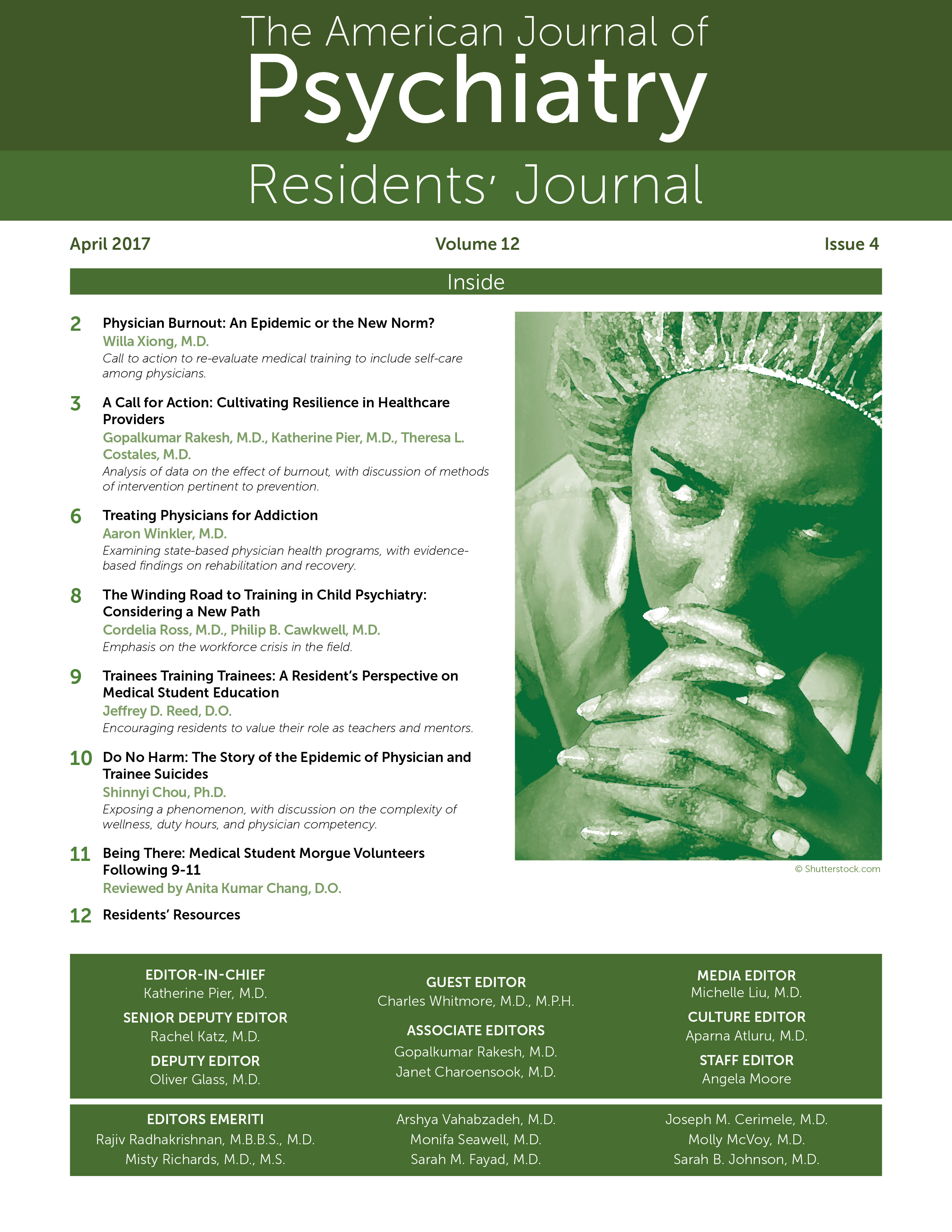Do No Harm: The Story of the Epidemic of Physician and Trainee Suicides
“There have been physician suicides in our community in recent years too”; my psychiatry department chair surprised me with this statement recently. I had thought that trainees such as myself would be notified of such tragedies, both to mourn the loss of a professional colleague and as a reminder to reflect on our own mental health needs. Perhaps there was a statement that slipped through my inbox, or even a community meeting I missed. Regardless, it is well known that physicians and trainees complete suicides at higher rates than the general population (1), yet only lately has the phenomenon garnered national attention. While medical institutions now tout wellness-centric cultures, evidence regarding improvements remains inconsistent (2, 3).
My exploration into this topic led me to Dr. Pamela Wible and Robyn Symon. A family physician, Dr. Wible runs the blog Ideal Medical Care (http://www.idealmedicalcare.org/), publishing stories of unfair treatment during training and of physician and trainee suicides. She believes “we live in a culture of abuse—even the term ‘physician burn out’ blames the victim” (4). Wible is featured in documentarian Robyn Symon’s film Do No Harm. Other stories include that of a medical student who survived a suicide attempt and a parent of a student who completed suicide weeks before graduation. In a statement from Wible, she lamented, “When you talk about wellness but not suicide, you water down what’s going on. I’m on the phone with parents who have lost their kids, and unless you’re on the phone like that you wouldn’t really feel the pain and anger. My passion gets really strong around the fact that this is hidden, because that just means that more people are going to die” (4).
For Symon, her documentary explores the following questions: “Why is the medical culture so toxic?… If it’s an epidemic, I don’t understand why. If it’s Ebola, it would have been quarantined and dealt with immediately for public safety…. When a physician jumps off a building it should be a national investigation” (5). It balances emotional anecdotes with rational arguments, featuring experts who study physician sleep deprivation and policy leaders such as Dr. Tom Nasca of the Accreditation Council for Graduate Medical Education, who concurred with the subject’s gravity. Symon hopes the film “achieves a compassion between doctors and patients…. Millennial patients are used to getting what they want, and if they don’t get good service it’s all over social media and doctors really suffer” (5). She is doing her part in promoting change, offering a VIP screening for the Association of American Medical Colleges. “I’ve been really happy and proud of how many courageous people have come out and tell their stories” (5), she says.
In an era when the complexity of wellness, duty hours, and physician competency are all under intense scrutiny, we are reassured by the constancy of imperfection. As a trainee who has long idealized this profession for its honorable intentions and worthwhile pursuits, I am inspired by those who value improving the system and the lives of the great men and women we call doctors.
The film will be released in 2017. More information about the film can be found online (https://www.indiegogo.com/projects/do-no-harm-documentary-film-depression#/; https://www.kickstarter.com/projects/965346530/do-no-harm-documentary-film; https://www.idealmedicalcare.org/blog/emmy-award-winning-filmmaker-takes-on-med-student-suicide-view-movie-trailer/).
1. The painful truth: physicians are not invincible. South Med J 2000; 93(10):966–973 Crossref, Google Scholar
2. : Whose problem is it? The priority of physician wellness in residency training. J Surg Educ Epub 2016; pii:S1931–7204(16)30219–7 Google Scholar
3. : The incorporation of stress management programming into family medicine residencies: Results of a national survey of residency directors: a CERA study. Fam Med 2015; 47(4):272–278 Google Scholar
4. Telephone interview, September 27, 2016 Google Scholar
5. Telephone interview, September 20, 2016 Google Scholar



